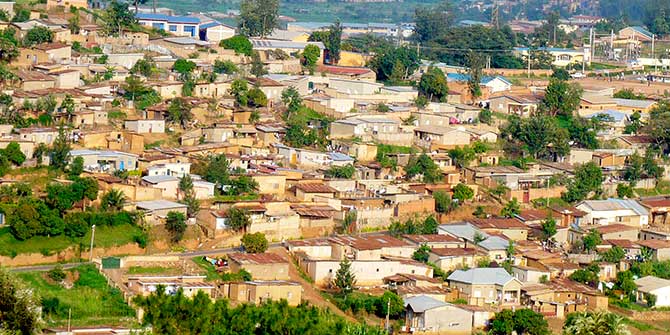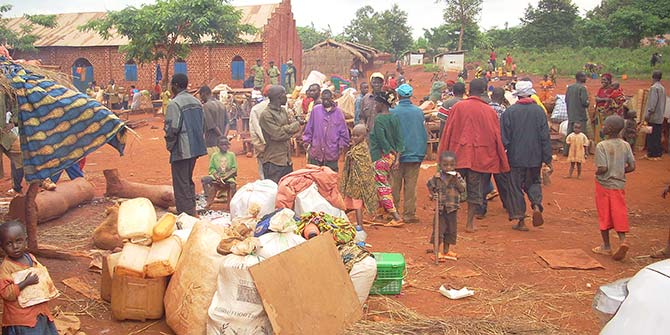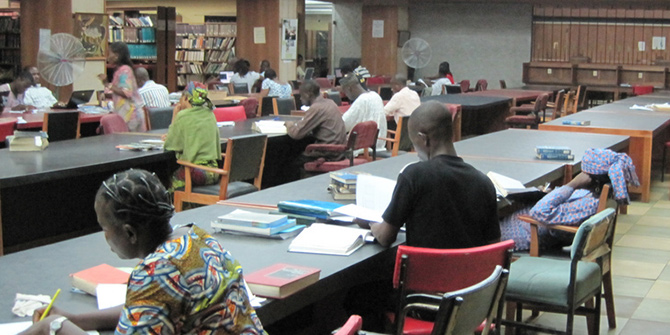Written in advance of the CPAID Workshop in Mombasa, Papy Muzuri Batumike, Samuel Keith Muhindo Balume and Patrycja Stys, give an intimate insight into the challenges of workshop preparation while in the field.
This article is part of the #PublicAuthority blog series, part of the ESRC-funded Centre for Public Authority and International Development.
Ahead of the CPAID workshop in Mombasa, Kenya, 5-8 September 2018, we decided to reflect on the preparations we are undertaking as participants. Unlike, or perhaps like, many others, we are doing it from the so-called ‘field’. We have been here for a week and a half researching expectations of and access to basic social services and conceptualisations of public authority in rural eastern Democratic Republic of the Congo (DRC).
We are taking this Sunday, 2 September, to do our ‘homework’ for the workshop. While Papy Muzuri Batumike and Samuel Keith Muhindo Balume draft blogs by hand, Patrycja Stys is typing on her mobile. The electricity is currently off and rarely stable enough to charge our laptops, and one is completely dead. We are trying to preserve the battery life of the other two.
Phone service of all networks aside from Orange quit inexplicably yesterday evening, so Internet access is essentially dial-up (if you are old enough to remember that), Edge, servers timing out, websites refusing to load, applications quitting. And Orange sending through texts every 45 seconds informing us we’re out of credit, which further destabilises the connection and drains battery life that is already issuing forth death rattles.

Image Credit: Pat Stys
It is a hard ask to draft blogs, comment on articles, prepare research presentations, and compose scripts for video blogs in these conditions. No, there is no running water, but that’s hardly the issue. It is the lack of power and stable internet access that are complicating our lives, more so now than usual.
Also, it is Sunday. But we all have interviews and meetings lined up tomorrow, none of which can be cancelled. Then, we drive straight from our current location to Kigali, arrive the evening of the 4 September, and fly to Mombasa at an altogether unholy hour the next day.
Spending field research time on such preparations is alien to all of us. The concentration here is usually on interviews and field notes and discussions and preliminary analyses – research. Living and learning. Fieldwork has a certain sanctity about it. Emails are unceremoniously auto-replied to and for the most part ignored. To think of it, everything aside from the research is usually unceremoniously ignored.
We hope to finish our own preparations by this evening, avoiding trying to work during a five-hour car drive on a road so brutally inadequate it essentially rearranges your internal organs. These efforts are hampered by now dead laptops and a hunt for petrol and negotiations to use a generator meant for the football matches this evening, as opposed to invested in our workshop preparations.
Despite the challenges and the frustrations, we are all really excited, which masks some of the exhaustion. This is the first time we will meet CPAID colleagues from Uganda and South Sudan, learning about their research and presenting our own, and honing our skills in effective media usage, presentations, and academic writing – together. Such opportunities are all too rare, and we are extremely fortunate. This is also why we’re grinding our teeth and doing our homework on a Sunday from the field.
Read more about #PublicAuthority and visit our website.
Samuel Keith Muhindo Balume (@samkeithmuhind1) is an independent researcher, photographer, cinematographer and works in international development.
Papy Muzuri Batumike (@MuzuriPapy) is a an independent researcher in North Kivu, Democratic Republic of the Congo.
Patrycja Stys (@pat_stys) is a Research Officer in the Centre for Public Authority and International Development (CPAID) at LSE.
The views expressed in this post are those of the author and in no way reflect those of the Africa at LSE blog, the Firoz Lalji Centre for Africa or the London School of Economics and Political Science.





